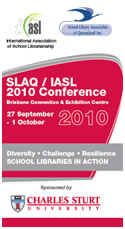A study of secondary students’ decision-making processes with respect to information use, particularly students’ judgements of relevance and reliability
DOI:
https://doi.org/10.29173/iasl7748Abstract
This report details an ongoing investigation of the decision-making processes of a group of secondary school students in south-eastern Australia undertaking information search tasks. The study is situated in the field of information seeking and use, and, more broadly, in decision making. Research questions focus on students’ decisions about the relevance and reliability of information. Data collected include video screen captures, think-aloud reports, and interviews. Qualitative data analysis developed a preliminary grounded theory to describe decision-making processes. Students depended on system-provided relevance cues, rejected particular resource categories, examined remaining items for general and specific relevance, and primarily used a process of corroboration to assess reliability. Selected implications for educators are raised.
Downloads
Published
Issue
Section
License

This work is licensed under a Creative Commons Attribution-NonCommercial-ShareAlike 4.0 International License.




